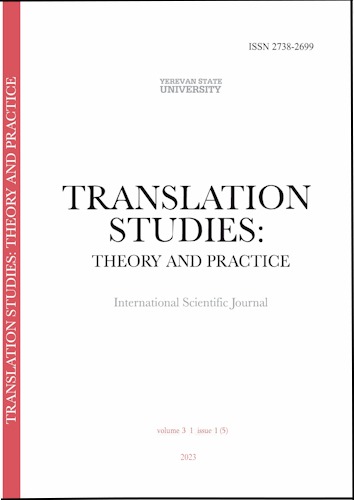Rewriting as Reception: Gary Snyder’s Representation of Chuang Tzu in His Eco-Poetic Literature
DOI:
https://doi.org/10.46991/TSTP/2023.3.1.014Keywords:
Gary Snyder, Chuang Tzu, eco-poetic literature, rewriting, receptionAbstract
Authored by the Chinese philosopher Zhuangzi, Chuang Tzu is another culturally significant Taoist canon, aside from Tao Te Ching. Due to its essential role in the development of Chinese philosophy and literature, Chuang Tzu has drawn the attention of sinologists worldwide to introduce this oriental masterpiece to their cultures and influenced the local literati. Burton Watson’s high-quality rendition The Complete Work of Chuang Tzu(1968) has been well-received by the renowned American poet Gary Snyder, who, based on Watson’s translation, rewrote Chuang Tzu in his eco-poetic literature to show his agreement with Zhuangzi’s philosophies. Most of scholars studying Snyder, however, seem to ignore his reception of Chuang Tzu and are more inclined to credit Tao Te Ching alone for his familiarity with Taoism. Thus, this study explores Snyder’s understanding of Chuang Tzu. Borrowing André Lefevere’s concept of rewriting and seeing it as a method of reception, this article conducts a comparative analysis between Snyder’s compositions and (Watson’s translation of) Chuang Tzu and investigates how Zhuangzi’s philosophies were rewritten and interpreted in Snyder’s context. It is found that Snyder rewrote Chuang Tzu mainly through commentary and imitation, and that some ideas were embraced directly while others were redefined and repositioned.
References
Bai, L. 2020. “Translating Chinese culture into English: from sole patronage to joint patronage”. Perspectives, vol. 28, no. 5, pp. 689-701.
Chen, X. 2009. “On Gary Snyder’s Zen Ecological Thoughts” (论加里·斯奈德的禅宗生态观). English and American Literary Studies, no.1, pp. 212-225.
Elder, S. 2017. “A Sense of the Land: An Interview with Gary Snyder”. In Conversations with Gary Snyder [Kindle DX version], edited by D. S. Calonne, the last chapter. Retrieved from Amazon.com
Hua, Y., and Li, J. 2020. The Way of Ecology – the Acceptance of Chinese Taoism in American Ecological Literature (生态之道——美国生态文学对中国道家思想的接受研究). Beijing: Peking University Press.
Lefevere, A. 1992. Translation, Rewriting & the Manipulation of Literary Fame. London and New York: Routledge.
Lefevere, A. 2000. “Mother Courage’s Cucumbers: Text, System and Refraction in A Theory of Literature”. In The Translation Studies Reader, (ed.) L. Venuti, pp. 233-249. London and New York: Routledge.
Lin, J. 2017. “A Study of the American Sinologist Burton Watson’s Sinological Translation Activities” (美国汉学家华兹生的汉学译介活动考论). Chinese Culture Research, no. 3, pp. 170-180.
Liu, B. 2021. “Gary Snyder’s Ecological Thoughts and China’s Taoism and Zen” (加里·斯奈德生态观和中国的“道”与“禅”). Overseas English, no. 16, pp. 8-9.
Liu, H. 2020. An exploration of poetological manipulation on Howard Goldblatt’s translation of Mo Yan’s Life and Death Are Wearing Me Out. Translation and Translanguaging in Multilingual Contexts, vol. 7, no. 2, pp. 200-223.
Lv, Y., and Li, M. 2013. “On the Entertainment Rewriting of English Movie Subtitle Translation – Taking the Subtitle Translation of Men in Black 3 and Madagascar 3 as Examples” (论英文电影字幕翻译的娱乐化改写——以《黑衣人3》和《马达加斯加3》的字幕翻译为例). Chinese Translators Journal, vol. 34, no. 3, pp. 105-109.
McLeod, D. 1990. “Some Images of China in the Works of Gary Snyder” (史耐德作品中的中国意象). (Chinese trans.) Chen Shengyi. Dangdai, vol. 53, p. 48.
Ou, H. 1994. “On Gary Snyder” (加里·斯奈德面面观). Foreign Literature Review, no.1, pp. 32-36.
Ren, J., and Liu, X. 2004. Cultural Interpretation of Environmental Ethics: An Exploration of Ancient Chinese Ecological Wisdom (环境伦理的文化阐释:中国古代生态智慧探考). Changsha: Hunan Normal University Press.
Snyder, G. 1974. Turtle Island. New York: New Direction Book.
Snyder, G. 1983. Axe Handle. New York: North Point Press.
Snyder, G. 1986. Left Out in the Rain. San Francisco: North Point Press.
Snyder, G. 1990. The Practice of the Wild. Berkeley: Counterpoint Press.
Snyder, G. 1992. No Nature: New and Selected Poems. New York and San Francisco: Pantheon Books.
Snyder, G. 1999. The Gary Snyder Reader: Prose, Poetry and Translations 1952-1998. Washington D. C.: Counterpoint.
Snyder, G. 2016. The Great Cold: Notes and Memoirs on Nature and History in East Asia. https://zh.b-ok.global/book/3329590/e765f9.
Tan, Q., and Qiu, Y. 2016. “The Construction of the Tao in Gary Snyder’s Ecopoetics” (“道”在加里·斯奈德生态诗学中的建构). Comparative Literature in China, no. 3, pp. 166-182.
Tsai, R. C-H. 2009. “The Ethics of Translation: Gary Snyder and Chinese literature”. ARIEL, vol. 40, no. 2, pp. 63-88.
Waley, A. 1934. The Way and Its Power: A Study of the Tao Te Ching and Its Place in Chinese Thought. London: George Allen & Unwin LTD.
Xu, W. 2015. The Cross-cultural Interpretation to Zen Poetics—The Evolution of Gary Snyder’s Zen (禅宗诗学的跨文化阐释——加里·斯奈德禅宗思想的嬗变). Retrieved from CNKI.
Yan, H. 2022. “Imitation as rewriting: Zhou Zuoren’s approach to William Blake’s poems on children in May Fourth China”. Perspectives, vol. 30, no. 6. pp. 911-925.
Zhao, W. 2009. “Literary criticism and the creation of Ibsen's image in China”. Perspectives, vol. 17, no. 3, pp. 137-149.
Zhong, L. 2006. Snyder and Chinese Culture (史耐德与中国文化). Beijing: Capital Normal University Press.
Zhuangzi. 1968. The Complete Works of Chuang Tzu. (English trans.) Burton Watson. New York: Columbia University Press.
Zhuangzi. 2007. Zhuang Zi. (Chinese trans.) Haitong Sun. Beijing: Chung Hwa Book Company.
Downloads
Published
How to Cite
Issue
Section
License
Copyright (c) 2023 Bilin Liu

This work is licensed under a Creative Commons Attribution-NonCommercial 4.0 International License.










